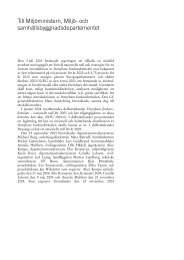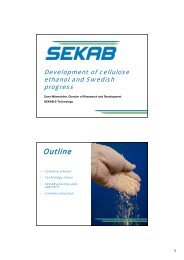Sugarcane ethanol: Contributions to climate change - BAFF
Sugarcane ethanol: Contributions to climate change - BAFF
Sugarcane ethanol: Contributions to climate change - BAFF
You also want an ePaper? Increase the reach of your titles
YUMPU automatically turns print PDFs into web optimized ePapers that Google loves.
Chapter 1<br />
Introduction <strong>to</strong> sugarcane <strong>ethanol</strong> contributions <strong>to</strong> <strong>climate</strong><br />
<strong>change</strong> mitigation and the environment<br />
Peter Zuurbier and Jos van de Vooren<br />
1. Introduction<br />
Life is energy. Humankind depends on energy and produces and consumes large volumes of<br />
energy. �e <strong>to</strong>tal �nal energy consumption in industry, households, services and transport<br />
in 2005 was 285 EJ (OECD/IEA, 2008). And the consumption is growing fast. �e growth<br />
of global �nal energy between 1990 and 2005 was 23%. Globally, energy consumption grew<br />
most quickly in the transport and service sec<strong>to</strong>rs. Between 1990 and 2005, global �nal<br />
energy use in transport increased by 37% <strong>to</strong> 75 EJ and according <strong>to</strong> the IEA study, road<br />
transport contributes the most <strong>to</strong> the increase in overall transport energy consumption.<br />
Between 1990 and 2005, road transport energy use increased by 41%. And with this growth,<br />
CO 2 emissions increased as well. �ese emissions grew during that same period with 25%<br />
(IEA, 2008). �e associated CO 2 emissions increased <strong>to</strong> 5.3 Gt CO 2 . �ere is a widely shared<br />
opinion that these emissions contribute <strong>to</strong> global warming and <strong>climate</strong> <strong>change</strong>. Reason<br />
enough for making a <strong>change</strong>.<br />
Another reason for making a <strong>change</strong>, are the fossil oil prices. Fact is that the price increased<br />
from $20 in 2002 <strong>to</strong> a record high of more than $140 a barrel in July 2008. �e price<br />
volatility creates a lot of uncertainty in global markets. So, it is not surprising that the world<br />
is looking for substitutes for petroleum-derived products. Securing a reliable, constant and<br />
sustainable supply of energy demands a diversi�cation of energy sources and an e�cient<br />
use of available energy.<br />
One of the alternatives for fossil fuels is biofuels. And here we enter in <strong>to</strong> the heat of the<br />
debate. Do biofuels help <strong>to</strong> reduce greenhouse gas emissions and o�ering new sources of<br />
income <strong>to</strong> farmers, by producing biomass? Are biofuels competing with food, animal feed<br />
and contributing <strong>to</strong> higher food prices? And are biofuels directly or indirectly threatening<br />
the environment, biodiversity, causing irreversible or undesirable <strong>change</strong>s in land use and<br />
landscape?<br />
In this publication we aim <strong>to</strong> set the stage for the discussion about both challenges and<br />
concerns of sugarcane <strong>ethanol</strong> by providing the scienti�c context, the basic concepts and<br />
the approach for understanding the debate on biofuel-related issues. �is book largely<br />
limits itself <strong>to</strong> sugarcane <strong>ethanol</strong> and its contribution <strong>to</strong> <strong>climate</strong> <strong>change</strong> mitigation and<br />
the environment.<br />
<strong>Sugarcane</strong> <strong>ethanol</strong> 19












